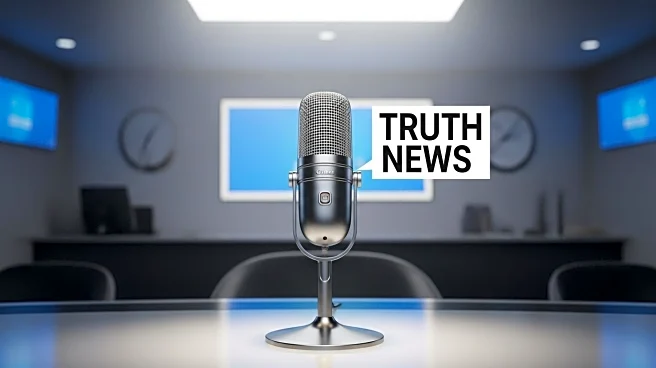What's Happening?
A rumor circulated online in September 2025 claiming that TV personality Simon Cowell was collaborating with late-night talk show hosts Jimmy Kimmel and Stephen Colbert to launch an uncensored news channel called 'Truth News.' This claim emerged shortly after ABC temporarily suspended Kimmel's show due to remarks he made about the political aftermath of the assassination of conservative activist Charlie Kirk. Despite the suspension, Kimmel's show was reinstated within a week, although some broadcast companies continued to preempt the show. Meanwhile, CBS announced the cancellation of Colbert's show in July, citing budget issues, though some critics speculated it was due to Colbert's criticism of President Trump. The rumor gained traction on social media, particularly on Facebook, where posts claimed Cowell would back the project as an architect and financier. However, investigations revealed that the story was fabricated, with no credible news outlets reporting on such a collaboration.
Why It's Important?
The spread of false information regarding the 'Truth News' channel highlights the challenges of misinformation in the digital age. Such rumors can influence public perception and create confusion, especially when involving high-profile figures like Kimmel, Colbert, and Cowell. The incident underscores the importance of media literacy and the need for consumers to critically evaluate the sources of their news. The false claim also reflects broader issues in the media landscape, where AI-generated content and clickbait stories are increasingly prevalent, aiming to generate advertising revenue through sensationalism. This situation serves as a reminder of the potential impact of misinformation on public discourse and the importance of verifying information before sharing.
What's Next?
As misinformation continues to be a significant concern, media organizations and platforms may need to implement stricter measures to combat the spread of false information. This could involve enhancing fact-checking processes and improving algorithms to detect and flag AI-generated content. Additionally, public awareness campaigns could be launched to educate consumers on identifying and avoiding misinformation. Stakeholders, including media companies and social media platforms, may face pressure to address these issues to maintain credibility and trust among their audiences.
Beyond the Headlines
The incident raises ethical questions about the role of AI in content creation and the responsibilities of those who use it to generate news. As AI technology advances, the potential for creating realistic yet false narratives increases, posing challenges for both consumers and regulators. This development could lead to discussions about the need for regulations governing AI-generated content and the ethical implications of using AI in journalism. Furthermore, the situation highlights the cultural impact of celebrity involvement in media, where their actions and statements can significantly influence public opinion and media narratives.










